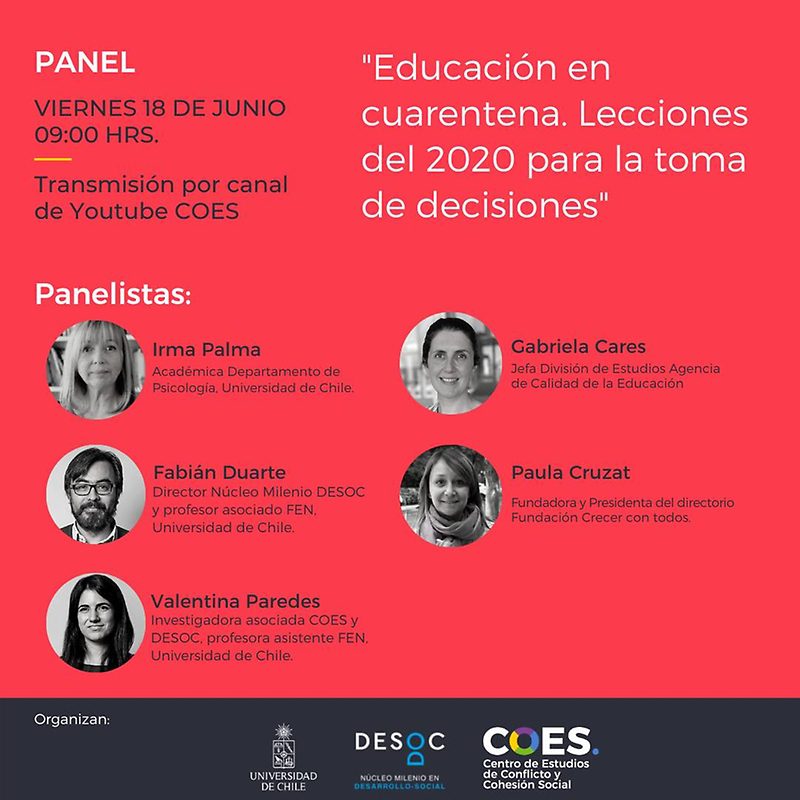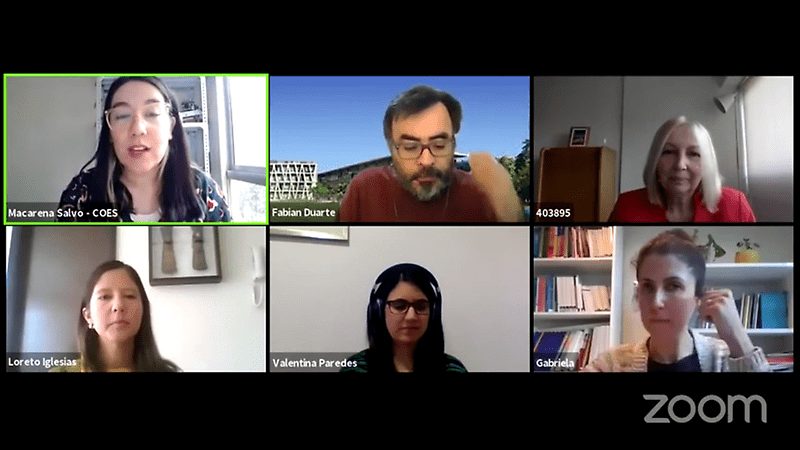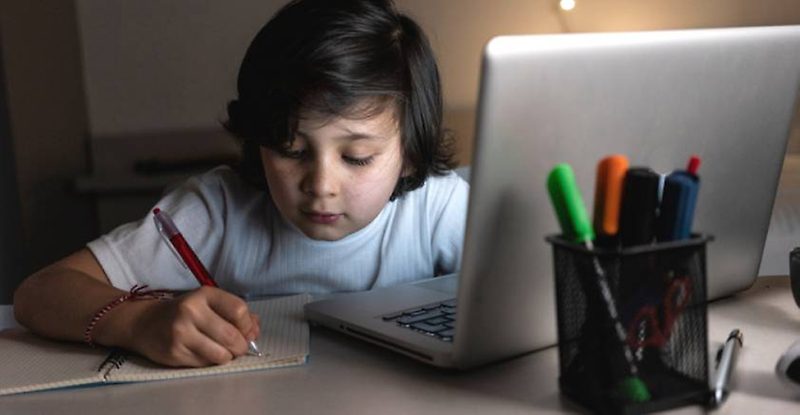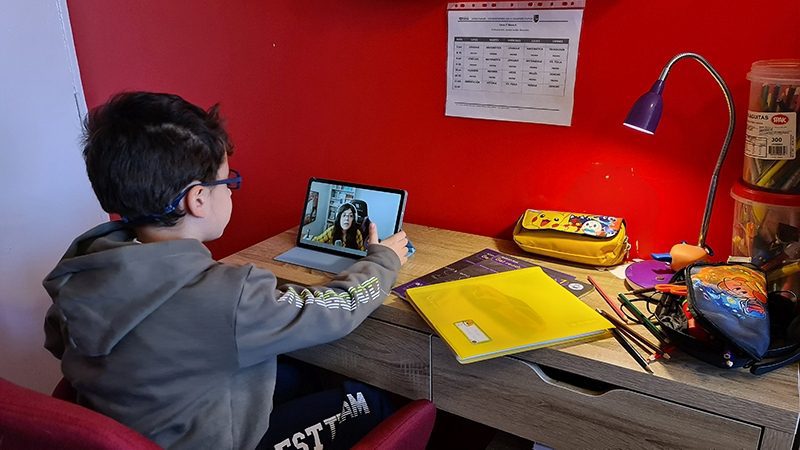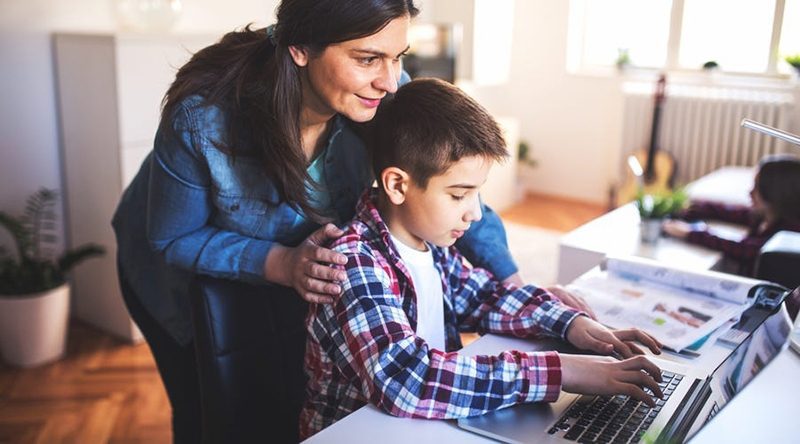Researchers from the University of Chile (a member of the Global MOOC Alliance) discussed the results of the Comprehensive Learning Diagnosis (in Spanish) and the “Life in a Pandemic” study (in Spanish), through which both institutions have been able to monitor the remote teaching and learning processes, and the experience of supporting vulnerable students by the Crecer Con Todos Foundation. The discussion addressed the reasons for the uneven distribution of educational resources and government responses during the pandemic, as well as the measures that the authority will take for a possible return or continuity of distance education.
The pandemic totally changed the way children and adolescents access education. A year and a half after education in quarantine, various studies account for the effects that the closure of classrooms has impacted on the development and on the lives of schoolchildren. Two of them have been the Comprehensive Learning Diagnosis (DIA), developed by the Education Quality Agency, and the “Life in a Pandemic” study, promoted by the University of Chile to monitor the impact of the health emergency on the population. The results were analyzed and debated in the meeting “Education in quarantine: 2020 lessons for decision-making”, organized by the Center for Social Conflict and Cohesion Studies (COES) and the Millennium Nucleus in Social Development (DESOC) on June 18.
The experience of remote support to vulnerable students carried out by the Crecer Con Todos Foundation was also presented. This allowed researchers to address the reasons for the education inequality in the context of the social and health crisis, the response and the measures that the authority will take in the face of a possible return to classrooms or the continuity of distance education. Irma Palma and Fabián Duarte, “Life in Pandemic” researchers, raised the Government’s duty to think about the continuity of the distance modality while health circumstances do not improve, since this has produced uncertainty and tensions in school communities. Loreto Iglesias, executive director of the Crecer Con Todos Foundation, highlighted the need for measures to guide school communities in remote contexts.
Education in quarantine
Gabriela Cares, head of the Research Division of the Education Quality Agency, presented some of the results of the Comprehensive Learning Diagnosis (DIA) study, developed between March and April of this year in 7,000 schools in the country, that warned students between fourth grade and sixth grade did not reach 60 percent of the necessary content in Spanish and did not exceed 47 percent in mathematics. Gabriela Cares explained that evaluating learning in these areas allowed diagnosing the socio-emotional well-being of students.
In his presentation, he highlighted that “90 percent of third and fourth grade students consider that confinement and remote education negatively affected their learning” and that “in accordance with the above, in all grades evaluated, most of the students were motivated to return to face-to-face classes ”. On the other hand, he indicated that “more than half of the students between fourth and sixth grade indicated that they would like their teachers to ask them how they have been during the health crisis, especially the most vulnerable students.” For this reason, he emphasized the importance of monitoring this dimension and generating actions to guide schools.
Regarding the results in the “Life in Pandemic” study, Irma Palma highlighted that the study identified “68 percent of parents or caregivers responded that their children have learned less or much less” than students in paid private schools. On the other hand, he pointed out, “68 percent of first-generation students would experience some difficulty with studying at a distance”. In addition, it detected important gaps in relation to remote education for different socioeconomic levels, mainly access to the Internet and computer devices.

The consequences of the education crisis were presented by the Comprehensive Diagnosis of Learning and the “Life in a Pandemic” study. 
The discussion addressed the reasons for the uneven distribution of educational resources and government responses during the pandemic. 
Cares indicated that “90% of third and fourth grade students consider that confinement and remote education negatively affected their learning.” 
“I think the central question is what the Ministry did or did not do, it is not the detriment of the closure of the schools,” commented Palma. 
“Learning from the experience of 2020 is the need to motivate teachers,” said Iglesias.
Loreto Iglesias, executive director of Crecer Con Todos Foundation – a program that offers schools to motivate reading in boys and girls – warned that “before the pandemic 6 out of 10 children did not read or did not understand what they were reading in fourth grade; and everything says that after the pandemic it will be even worse since it is expected that 3 out of every 4 students will not have the skills expected at their level.” With this deepening of the educational crisis, he pointed out, “the Foundation quickly took measures and, assuming that children could only access a cell phone, we implemented a program on mobile devices with students, schools and incorporating families in the process. For this, we created applications, audiobooks, friendly resources for children to play and learn. The weekly response level was 40 percent, the challenge for 2021 has been to incorporate the 60 percent who did not participate”.
Role of the State
Irma Palma, who is also an academic at the Faculty of Social Sciences of the University of Chile, stated that the closure of schools cannot be directly and simply related to consequences on the well-being and learning of children and adolescents. “I think the central question is what the Ministry did or did not do, it is not the detriment of the school closures, it is the detriment of what was done or not done after the school closures. It was a closure that also came from society, not from the Ministry, that is why it has always been focused on return. How that fits is central to what’s next. A second question is how the Ministry interprets this partial failure that it has had, if it interprets it as a design problem or if it interprets it as the result of resistance from society. If we do it as a result of resistance, the point is how the resistance was addressed and why it did not happen to the university system”, he commented.
Fabián Duarte, academic from the Faculty of Economics and Business of the University of Chile and director of the Millennium Nucleus in Social Development (DESOC), added that in “Life in a Pandemic” study, it was possible to appreciate that the socioeconomic level did not affect learning so much. “What was important, and had a high correlation with learning, was social-emotional support, feeling accompanied by their teachers and having relationships with their peers. This made the perception of the guardian, father or mother, that the child was learning and saw fewer difficulties”. In this sense, on what to do in the future, he stated that the focus should be to take advantage of what was learned in this period of remote education. “I think emotional support is key in this, as Irma mentioned in the Life in Pandemic results, where we realized that the support of teachers is important. But you have to give support to them too, I think that is where the keys lie,” he said.
Loreto Iglesias, meanwhile, argued that “learning from the experience of 2020 is the need to motivate teachers, whose workload is different, to train them in the use of tools for distance learning to reach families.” He also added that “intensive leveling work is required so that children can progress, even at a distance, and we must change the curriculum that was designed for second grade and take what was not achieved the previous year, level it and then keep moving forward, so that the gaps are not irreversible.” Finally, he stated that the most important thing is to devise a national plan on how to approach the return to school, so that it has a meaning, and the need for clear guidelines to school communities by the authority.
Valentina Paredes, Researcher at COES and DESOC and academic at the Faculty of Economics and Business of the University of Chile, valued the contribution of these experiences that provide a diagnosis of education in quarantine, but warned of the limitations that each of them has to have an appreciation of reality and noted that it is necessary to be careful when reading the results. “If we do not have a very clear reference point, we may be evaluating in a different way regarding what is a learning loss,” he said
The Spanish version of this article originally appeared on https://www.uchile.cl/noticias/177157/investigadores-cruzan-visiones-sobre-la-educacion-en-pandemia

